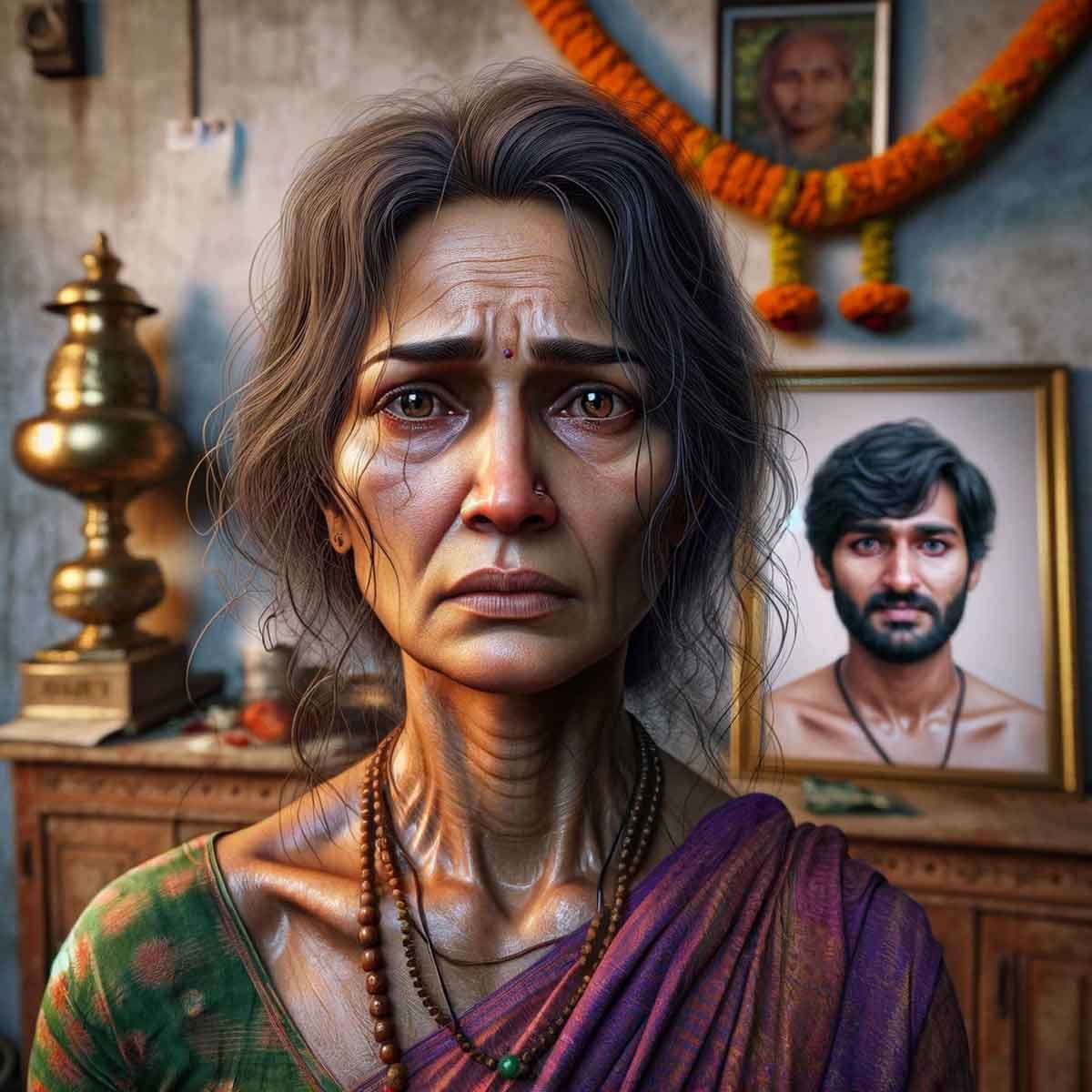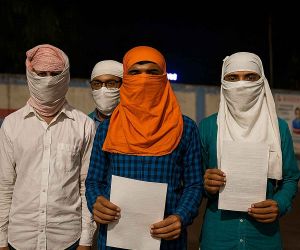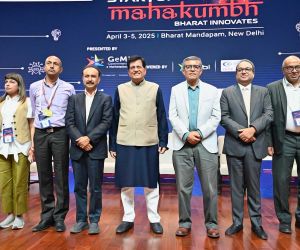MORE COVERAGE
Twitter Coverage
Satyaagrah
Written on
Satyaagrah
Written on
Satyaagrah
Written on
Satyaagrah
Written on
Satyaagrah
Written on
JOIN SATYAAGRAH SOCIAL MEDIA
Against a mother's hesitant heart, Abhijit's journey ends in tragedy, marking him as the 9th Indian lost in the US this year, alongside Neel Acharya, Vivek Saini, and more; their stories, a sombre echo of dreams shattered far from home, cry out for safety

In recent times, the United States has seen a worrying trend of fatalities among Indian nationals. The latest in this series of sorrowful events is the murder of a student from Andhra Pradesh.
Massachusetts police have discovered the lifeless body of Paruchuri Abhijit, marking yet another devastating blow to the Indian community in America. Abhijit, originally from Burripalem in the Guntur district of Andhra Pradesh, was found deceased inside a car parked in a secluded forest area. This incident has been recorded as the ninth murder of an Indian national in the USA in a string of similar tragedies.
Abhijit had embarked on his academic journey at Boston University just last year, choosing to live off-campus with his classmates in a rental property. Concerns rose when Abhijit failed to return home after his classes. His friends, troubled by his uncharacteristic absence, promptly reported him missing to the local police. The law enforcement's efforts to locate him led to the grim discovery of his body in a vehicle in a nearby forest.
Abhijit was the cherished son of Chakradhar and Srilakshmi, hailing from Manuchurir. As an only child, his academic pursuits were a beacon of hope and pride for his family. Notably, his mother, Srilakshmi, had reservations about her son studying abroad. Despite her apprehensions, she eventually consented to his overseas education after considerable thought. This decision, made with the best intentions for Abhijit's future, now leaves a family in mourning, grappling with an irreplaceable loss.
Continuing from the distressing incident involving Paruchuri Abhijit, the 23-year-old engineering student at Boston University met a tragic end. Abhijit's journey at Boston University commenced only last year, where he opted to share accommodation with fellow classmates in a rented dwelling. The alarm was raised when, on the 11th of March, Abhijit failed to return to his residence following the conclusion of his academic commitments. His concerned friends, troubled by his uncharacteristic absence, took immediate action by notifying the police and filing a report of his disappearance.
The law enforcement authorities initiated a prompt investigation, leveraging technology to trace Abhijit's mobile phone signals. This crucial piece of evidence led them to a shocking discovery: Abhijit's lifeless body was found inside a vehicle, concealed in a forest close to the vicinity. It is the consensus among investigators that the young student's life was cruelly snatched away on the very day of his disappearance, the 11th of March. The perpetrators of this heinous act remain unidentified, but it is believed they encountered Abhijit within the bounds of the university campus. Subsequently, his body was callously placed in a car and left in a forested area, a grim testament to the violence he suffered.
|
As the investigation progresses, many questions linger, notably regarding the motive behind this brutal act. The authorities are exploring all angles, including the possibility that the attackers were motivated by a desire to rob Abhijit of money and his laptop. This theory, while partially illuminating the rationale behind the crime, does not lessen the profound sense of loss and injustice felt by all who knew Abhijit. The circumstances leading to his murder on the university campus are shrouded in mystery and speculation, highlighting the urgent need for answers and accountability.
Abhijit, a 23-year-old engineering student at Boston University, tragically lost his life in an incident that has left his friends, family, and the university community in shock. Last year, he took a significant step in his life by moving to the United States to pursue his engineering degree at Boston University. He shared a rented house with his classmates, creating a new home away from home. However, his promising journey came to an abrupt and sorrowful end.
On March 11, after attending his classes, Abhijit did not return home. His absence alarmed his friends, who had expected him back as usual. Concerned for his well-being, they promptly contacted the police to report him missing. In response, the police initiated a search to locate him. Leveraging technology, they tracked the signals from Abhijit's mobile phone, which led them to a nearby forest. There, in a car hidden amongst the trees, they found Abhijit's dead body, turning their concern into a devastating reality.
The circumstances of Abhijit's death are both mysterious and tragic. It is believed that on the very day he was last seen, March 11, he encountered unidentified individuals on the campus of Boston University who fatally harmed him. The perpetrators then concealed his body in a car, choosing a secluded forest as their grim hideaway. This act of violence has triggered an ongoing investigation by the police, who are determined to uncover the truth and bring justice to Abhijit.
As the investigation continues, the motive for Abhijit's murder remains uncertain.
In the aftermath of the tragic loss of Abhijit, a beacon of hope and dreams for his family, the Telugu community has rallied together in an act of solidarity and support. Members of various Telugu associations have taken it upon themselves to ensure that Abhijit's body is returned to his homeland, a gesture that speaks volumes of their communal spirit and respect for the departed soul. After navigating the complex maze of formalities required in the United States, they succeeded in sending his body back to Burripalem, in the Guntur district, ensuring that Abhijit could be laid to rest among his ancestors and within the embrace of his motherland.
Abhijit, the only child of his parents, was the embodiment of their hopes and dreams. His mother, torn between the fear of distance and the desire for her son's success, reluctantly agreed to let him pursue his aspirations abroad. She had hoped that by allowing him to attend Boston University, where he had secured an engineering seat, she was setting him on a path to a bright and prosperous future. Little did she know that this decision would lead to an irreplaceable loss.
The question that now haunts the grieving community is one that reflects a profound and heartbreaking dilemma: "Why do you people go to the US when Mother India has so many options? There are millions of Engineers who are happily living and prospering in India." This query is not just a reflection of sorrow but also a poignant reminder of the dreams and aspirations that lead many to distant shores, in search of opportunities that they believe are beyond reach in their homeland. The tragic story of Abhijit is a heartbreaking testament to the complex interplay of ambition, sacrifice, and the unforeseen risks that come with stepping into the unknown.
|
Multiple Cases of Unnatural Deaths of Indians in the US Highlight Growing Concerns
In a disturbing trend that has caused widespread concern among the Indian community in the United States, there has been a significant rise in the number of attacks on Indians, particularly students. This worrying increase has been underscored by the tragic death of Abhijit, marking the ninth such incident where an Indian student has lost their life in America this year alone.
The year started on a somber note with the death of 19-year-old Neel Acharya, who was found deceased on the Purdue University West Lafayette campus after being reported missing. Neel, a US citizen, was discovered under circumstances that led authorities to conclude that there were "no trauma or significant injuries found during the autopsy on Acharya and 'no foul play is suspected at this time'." This incident added to the growing list of tragedies befalling Indian students in the US.
Another heart-wrenching incident occurred in January, when 25-year-old Indian student Vivek Saini was brutally murdered by a homeless drug addict in Georgia, attacked with a hammer in a senseless act of violence. In a similarly horrifying event, Syed Mazahir Ali from Hyderabad, who was pursuing a Master's in Information Technology, was chased and savagely attacked by three unidentified men in Chicago, highlighting the perilous situations Indian students are finding themselves in abroad.
The sequence of deaths among Indians in the United States didn't stop there. On February 27th, Bharatnatyam and Kuchipudi dancer Amarnath Ghosh, originally from West Bengal's Birbhum, succumbed to multiple gunshot wounds after being shot while on an evening walk. He was rushed to the hospital but could not be saved, adding another name to the list of Indians whose dreams were cut short in the US.
In a particularly tragic case on January 23rd, 18-year-old Indian student Akul Dhawan lost his life after being denied entry to a nightclub. The cold, unyielding night claimed his life through hypothermia, exacerbated by acute alcohol intoxication and prolonged exposure to frigid temperatures. Champaign County Coroner Stephen Thuney released a statement, declaring Dhawan's death unintentional but preventable, underscoring the harsh realities facing young Indian nationals in foreign lands.
One such incident that drew widespread attention occurred last year when Janhavi Kandula, an Indian student, met with a tragic fate in Seattle. She was struck by a patrol car driven by police officer Kevin Dave, who was responding to an emergency call and traveling at a speed of 74 mph (119 kph). The impact was so severe that Kandula's body was flung about 100 feet (30 meters) away from the collision site at Dexter Avenue North and Thomas Street. The aftermath of this heartbreaking incident saw officer Dave not facing any criminal charges due to "lack of evidence," a decision that has stirred conversations and concerns within the community.
On February 5th, another somber discovery was made when 23-year-old Sameer Kamath, a doctoral candidate in mechanical engineering at Purdue University, was found deceased in Warren County, Indiana. The circumstances surrounding his death added to the series of unfortunate events befalling Indian students in the US.
Adding to the string of distressing news, Shreyas Reddy, a student from the Linder School of Business, was found dead in Cincinnati, Ohio. The details of what led to his demise remain unclear, leaving another family and the student community in search of answers.
This period also saw the loss of Vivek Saini and Neel Acharya, whose deaths were reported in the same week. Neel Acharya, also a student at Purdue University, was found lifeless on the campus on January 30th. Vivek Saini's life was brutally ended with repeated hammer blows by a homeless individual inside a store in Lithonia, Georgia, on January 29th.
Furthermore, on February 7th, Vivek Taneja, a 41-year-old man of Indian origin, succumbed to injuries after a severe assault by an unidentified assailant in downtown Washington, D.C., marking another grim episode in the series of violent incidents.
In another heart-wrenching case, an Indian-origin family, comprising Anand Sujith Henry, his wife Alice Priyanka, and their twin children, Noah and Neithan, was found deceased in their apartment in California. The San Mateo police confirmed the tragic loss of the family on February 13th, adding to the growing list of Indian nationals who have met untimely deaths in the United States this year.
These incidents have not only left families and friends in mourning but have also raised serious concerns about the safety and well-being of Indian nationals living, studying, and working in the United States. Each story carries the weight of dreams unfulfilled and lives cut short, casting a long shadow over the aspirations of many who seek a better future abroad.
US Administration Assures Safety Amid Concerns
In response to the growing concerns regarding the safety of Indian students in the United States, the Biden administration has stepped forward to address these issues. Eric Garcetti, the US Ambassador to India, has made a statement acknowledging the distressing incidents that have occurred. He conveyed the administration's commitment to enhancing safety measures for the Indian diaspora, underlining the efforts being made to ensure the US remains a secure and attractive destination for education.
Ambassador Garcetti expressed deep sorrow over the "unfortunate" loss of Indian students, stating that such tragedies touch the hearts of everyone involved. He highlighted the US government's dedication to ensuring the well-being of international students, emphasizing that the safety of those coming to study from abroad is a top priority. "Our heart always is touched when any tragedy, whether it is a life taken by somebody or any violence, no matter who they are," Garcetti remarked during an event, showcasing the administration's empathy and concern for all individuals affected by violence and loss.
Further emphasizing the United States' appeal as a premier destination for higher education, Ambassador Garcetti pointed out that, despite the occurrences of these tragedies, the US continues to be a favored choice among Indian students. He acknowledged the inherent risks that come with being in any part of the world but reassured that the US government is actively working to make the country a safe and welcoming place for study.
Garcetti also stressed the importance of collaboration between the American and Indian governments in addressing these concerns. By working together, both nations aim to bolster the safety and security of the Indian diaspora in the United States. This cooperative approach signifies a mutual commitment to ensuring that students and families from India can pursue their educational and professional aspirations without fear, making the US a "wonderful place to study and to be safe."
 |
 Support Us
Support Us
Satyagraha was born from the heart of our land, with an undying aim to unveil the true essence of Bharat. It seeks to illuminate the hidden tales of our valiant freedom fighters and the rich chronicles that haven't yet sung their complete melody in the mainstream.
While platforms like NDTV and 'The Wire' effortlessly garner funds under the banner of safeguarding democracy, we at Satyagraha walk a different path. Our strength and resonance come from you. In this journey to weave a stronger Bharat, every little contribution amplifies our voice. Let's come together, contribute as you can, and champion the true spirit of our nation.
 |  |  |
| ICICI Bank of Satyaagrah | Razorpay Bank of Satyaagrah | PayPal Bank of Satyaagrah - For International Payments |
If all above doesn't work, then try the LINK below:
Please share the article on other platforms
DISCLAIMER: The author is solely responsible for the views expressed in this article. The author carries the responsibility for citing and/or licensing of images utilized within the text. The website also frequently uses non-commercial images for representational purposes only in line with the article. We are not responsible for the authenticity of such images. If some images have a copyright issue, we request the person/entity to contact us at This email address is being protected from spambots. You need JavaScript enabled to view it. and we will take the necessary actions to resolve the issue.
Related Articles
- In a tragedy that has shattered hearts globally, the young and bright Jaahnavi Kandula's life was unjustly taken, outrage boils as Officer Daniel Auderer displays an abominable lack of humanity, laughing and making vile remarks about her tragic death
- "Mass Shooting": 15-year-old girl, Natalie ‘Samantha’ Rupnow, opened fire at Abundant Life Christian School in Madison, killing 2 people and injuring 6 others before dying from a self-inflicted gunshot wound, marking the 83rd school shooting in 2024
- USA gun violence claims the life of Indian doctoral student Aaditya Adlakha in Cincinnati, mirroring the tragic fates of Jude Chacko, Saiesh Veera, and Devsish Nandepu - all lost on foreign soil, far from their motherland's embrace, their dreams shattered
- Adding to the grim tally, Indian students Nivesh Mukka and Goutham Parsi killed in a fatal car crash in Arizona; both enrolled at Arizona State University, their untimely demise underscores the ongoing safety challenges faced by Indian students in the US
- One more Indian-origin Vivek Taneja dies in Washington days after life-threatening assault, a distressing trend continues as Sameer Kamath, Shreyas Reddy, Neel Acharya, Vivek Saini, & Akul Dhawan also fall victim to escalating attacks on Indians in the US
- "No one left in family": Amarnath Ghosh, an exceptional Indian classical dancer & Washington University scholar, tragically murdered in St. Louis; body languishes in the morgue on day 6 as the Indian Consulate in Chicago urges a swift police investigation
- “Monkeypox is demonstrating why smart people stay in monogamous relationships”: Defense Department spokesman Maj. Charlie Dietz announced the number of cases of monkeypox climbed tenfold in the U.S. military in less than four weeks ago
- India condemns Connecticut General Assembly for recognising declaration of Sikh Independence: 'Mischievous elements using Assembly for nefarious purposes, India and USA has no place for bigotry and hatred'
- "That's the worst thing about dementia: it gets you every time": Old Joe Biden isn’t all there, confident and full of bravado, the senescent and dementia-ridden read off his teleprompter: “Let me start off with two words: made in America. Made in America”
- EAM Jaishankar dismisses claims of institutional prejudice against minorities in India and critiques the UN, stating it 'lacks credibility and, to a large degree, effectiveness,' his US visit underscores India's pivotal role in reshaping global narratives
- "Whiff of election games": US charges of an Indian 'govt employee' paying $100,000 to a 'hitman' for Khalistani terrorist Pannun sound like a poorly crafted fiction, Nikhil Gupta contacting a DEA undercover agent for the Hit? A comically weak plot!
- "When a warMonger lectures about peace, you know hypocrisy has found its poster child": Obama, the 'Nobel Peace Prize' laureate with a track record of 'peaceful drone strikes', architect of Middle East chaos lectures our Modi on human rights. That's rich!
- "Harvard latest course: How to lose billionaires 101": As the Harvard university's stance on a pro-Hamas letter sparks debate, luminaries like Idan Ofer and Wexner Foundation cut all the ties, Harvard's once-untouchable prestige now faces serious scrutiny
- Philadelphia Mass shooting in USA: 3 dead, 11 injured after multiple attackers open fire at crowded street using automatic weapons which are easily available in US stores, No arrests till now, police looking for surveillance footage
- "Titanic was called the Ship of Dreams, and it was. It really was": Deep-Sea Tragedy: The Catastrophic Implosion of Titan Submersible and the Lives Lost, it was on a mission to explore the Titanic, a ship that itself met a tragic end on its maiden voyage

























